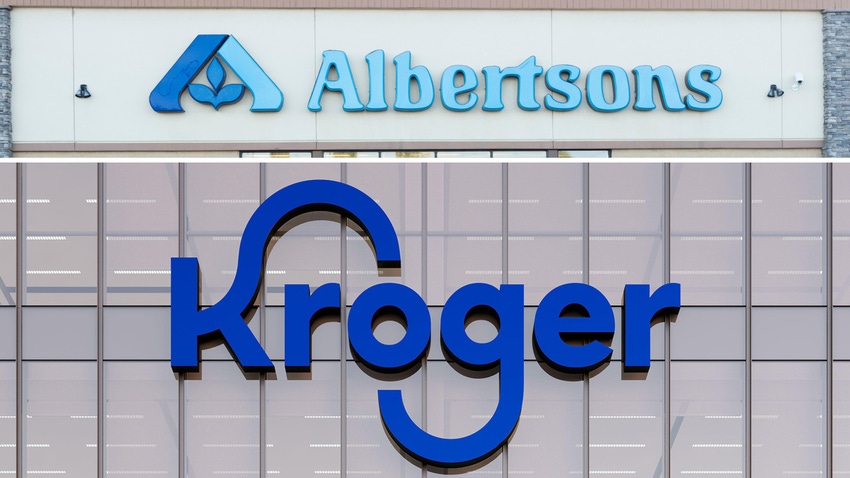FTC, nine states sue to stop Kroger, Albertsons merger
The government agency and the supermarkets dispute the merger’s effects on competition, consumers, employees and prices. Find out more.

The U.S. Federal Trade Commission filed a lawsuit on Monday to stop Kroger’s pending purchase of Albertsons.
Kroger Company, which is based in Cincinnati, Ohio, and Albertsons Companies Inc. announced in October 2022 they planned to merge in a $24.6 billion deal. They are the country’s two largest supermarket chains, operating a number of banners across the nation.
The complaint will be filed in the U.S. District Court for the District of Oregon.
The FTC argues that the merger would “eliminate fierce competition between Kroger and Albertsons, leading to higher prices for groceries and other essential household items for millions of Americans," according to the agency’s press release.
“This supermarket mega merger comes as American consumers have seen the cost of groceries rise steadily over the past few years. Kroger’s acquisition of Albertsons would lead to additional grocery price hikes for everyday goods, further exacerbating the financial strain consumers across the country face today,” Henry Liu, director of the agency’s Bureau of Competition, said in the released statement. “Essential grocery store workers would also suffer under this deal, facing the threat of their wages dwindling, benefits diminishing, and their working conditions deteriorating.”
Attorneys general from nine states are joining the lawsuit: Arizona, California, the District of Columbia, Illinois, Maryland, Nevada, New Mexico, Oregon and Wyoming. The attorneys general from Colorado and Washington have already filed lawsuits.
If the merger is completed, the new chain will operate about 5,000 stores across the continental United States, The New York Times reports.
“This decision shows that the F.T.C. understands how the outsized power of big retailers is damaging the entire food system,” Stacy Mitchell, co-executive director at the Institute for Local Self-Reliance, a nonprofit advocate for independent businesses, tells The New York Times. “These two giants already exert their power as dominant buyers of food and goods by bullying suppliers into giving them discounts and benefits they don’t offer to smaller food retailers.”
Kroger’s reaction, released Monday afternoon, refutes the FTC’s statements, saying that the merger will reduce costs and lower prices for consumers.
“Kroger has reduced prices every year since 2003, resulting in $5 billion invested to lower prices and a 5% reduction in gross margin over this period,” the grocer’s statement says. “Kroger has a proven track record of lowering prices so more customers benefit from fresh, affordable food, and our proposed merger with Albertsons will mean even lower prices and more choices for America's consumers.”
“The combined company committed that no stores, distribution centers or manufacturing facilities will close as a result of the merger, including those divested to C&S Wholesale Grocers,” it continues. Kroger and Albertsons have chosen to divest several hundred stores to C&S wholesale grocers.
Albertsons also issued a statement to counter the FTC’s arguments. “Albertsons Cos.’ merger with Kroger will ensure our neighborhood supermarkets can better compete with these mega retailers, all while benefitting our customers, associates, and communities,” Albertsons said in a prepared statement quoted by The Associated Press. “We are disappointed that the FTC continues to use the same outdated view of the U.S. grocery industry it used 20 years ago.”
Corporate promises to hold down prices and pay better wages often don’t hold true, however. Christine Bartholomew, a professor at the University at Buffalo School of Law, tells The Washington Post that a 2012 FTC study on retail grocery mergers shows “evidence that horizontal mergers in the supermarket industry can result in significant increases in consumer prices and thereby harm consumers.”
However, the study also says, “The ability to draw general conclusions regarding the efficacy of horizontal merger policy from the published literature is limited” in part because such a small percentage of mergers have been studied.

FTC concerned about divestiture plans
The FTC’s statement announcing the lawsuit incorrectly states that C&S Wholesale Grocers “today operates just 23 supermarkets and a single retail pharmacy.” The C&S, Piggly Wiggly and Grand Union websites list 145 Piggly Wiggly locations in New York, South Carolina and Wisconsin, and 11 Grand Union Locations in New York.
“The FTC’s administrative complaint alleges that Kroger and Albertsons’s inadequate divestiture proposal is a hodgepodge of unconnected stores, banners, brands, and other assets that Kroger’s antitrust lawyers have cobbled together and falls far short of mitigating the lost competition between Kroger and Albertsons,” the statement says.
Writing in Forbes, Phil Lempert reports that C&S Wholesale Grocers would operate 413 stores and eight distribution centers after the merger is completed. He notes that in addition to operating about 160 supermarkets, C&S supplies groceries to “more than independent supermarkets, chain stores, military bases, and institutions with over 100,000 products.”
Lempert suggests that plenty of established grocery chains would eagerly take over some Kroger and Albertsons locations in California, while Amazon Fresh—brick-and-mortar stores operated by Amazon—could purchase dozens of divested locations to “finally fulfill Jeff Bezos’s dream to be a major player in the supermarket world.”
Amazon opened its first Amazon Fresh store in Woodland Hills, California, on Sept. 17, 2020, and “paused” new openings in February 2023, when it operated 44 locations and 28 Amazon Go stores, which are cashier-less convenience stores. Today, it operates 43 Amazon Fresh stores, according to the Amazon website.
Lempert says these various chain supermarkets would increase competition and benefit shoppers. He didn’t specify Whole Foods Market, also owned by Amazon, as one of those chains.
Unions react positively to FTC’s action
"The FTC's decision reflects clear concerns over the impact such a megamerger could have on workers, food prices, and millions of customers," Marc Perrone, president of the United Food and Commercial Workers International Union says in a statement quoted by Reuters. Several locals issued a joint statement supporting the lawsuit, as well, according to the news agency.
Kim Cordova, president of UFCW Local 7 that represents grocery workers in Colorado and Wyoming, tells Reuters that the consolidation of Kroger and Albertsons would be dangerous right now because inflation is hurting Americans. In Colorado and Wyoming, King Soopers is owned by Kroger while Albertsons own Safeway.
In response to the unions’ statements, a Kroger spokesperson said that non-unionized retailers will continue to grow if the merger is blocked, Reuters reports.
Mark Cohen, director of retail studies at Columbia Business School, tells The Washington Post that grocery prices have increased 26% in the last four years. The FTC is likely concerned that the merger would derail President Joe Biden’s efforts to reduce inflation.
About the Author(s)
You May Also Like




